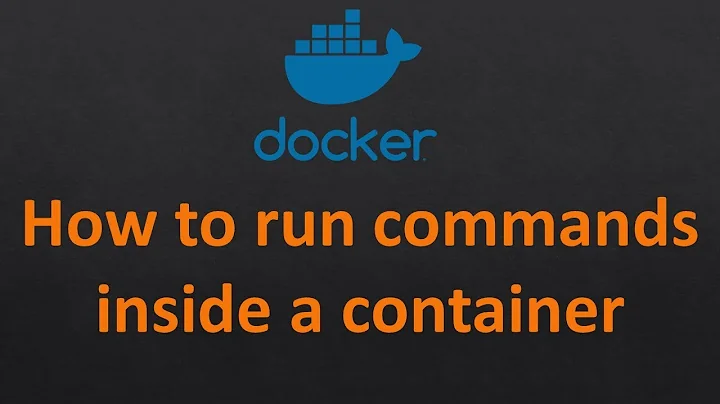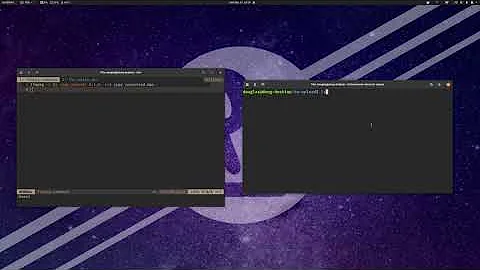automatic docker login within a bash script
Solution 1
Docker 18 and beyond
There's now an officially-documented way to do this:
cat ~/my_password.txt | docker login --username foo --password-stdin
Docker 1.11 through Docker 17
You can pass all the arguments on the command-line:
docker login --username=$DOCKER_USER --password=$DOCKER_PASS $DOCKER_HOST
If you don't specify DOCKER_HOST, you'll get the main Docker repo. If you leave out any of the arguments, you'll be prompted for that argument.
Older than 1.11
The same path as just above, except that you need to also pass an --email flag. The contents of this are not actually checked, so anything is fine:
docker login --username=$DOCKER_USER --password=$DOCKER_PASS $DOCKER_HOST --email [email protected]
Solution 2
To run the docker login command non-interactively, you can set the --password-stdin flag to provide a password through STDIN. Using STDIN prevents the password from ending up in the shell’s history, or log-files.
$ echo $DOCKER_PASS | docker login -u$DOCKER_USER --password-stdin $DOCKER_HOST
Solution 3
When you login to your private registry, docker auto create a file $HOME/.docker/config.json The file had the Credentials info, so you could save the file and copy to any host when you want to login the registry.
The file content like this:
{
"auths": {
"example.com": {
"auth": "xxxxxxxxxxxxxxxxxxxxxxx"
}
}
}
Add-on If you want to login multi docker registry on one server ,just add another auth info.like this:
{
"auths": {
"example.com": {
"auth": "xxxxxxxxxxxxxxxxxxxxxxx"
},
"example1.com":{
"auth": "xxxxxxxxxxxxxxxxxxxxxxx"
}
}
}
Now you can push and pull images from the example.com and example1.com.
Solution 4
For any random passer by that may stumble into this looking for a way to use this against an Openshift environment's container registry (Docker) you can use the following to provide the registry URI along with the credentials to log into it using an Openshift token.
$ echo "$(oc whoami -t)" | docker login -u $USER --password-stdin \
$(oc get route docker-registry -n default --no-headers | awk '{print $2}')
Login Succeeded
The above does 3 things:
- Passes token retrieved from Openshift
oc whoami -t Determines Openshift's registry URI
$(oc get route docker-registry -n default --no-headers | awk '{print $2}'`)Logs into registry using
$USER+ token from above
Related videos on Youtube
Admin
Updated on February 16, 2021Comments
-
 Admin about 3 years
Admin about 3 yearsHow can I preseed my credentials to
docker logincommand within a script ?I'm using a bash script that basically automates the whole process of setting up my custom VMs etc, but when I need to login to docker within the script to pull the images, I get the following error:
Username: FATA[0000] inappropriate ioctl for device
The command I was using is the following:( echo "xxx"; echo "yyy"; echo "zzz" ) | docker login docker.somesite.org
Is this possible to achieve without using and coping over an existing.dockercfgfile and how,
Many thanks.-
James Mills almost 9 yearsYou'll have to use expect/pexpect
-
-
 antonbormotov about 8 yearsShort notation might be more convenient:
antonbormotov about 8 yearsShort notation might be more convenient:docker login -u $DOCKER_USER -p $DOCKER_PASS -m $DOCKER_EMAIL $DOCKER_HOST -
 Nathaniel Waisbrot about 8 yearsIt's a matter of preference, but when I'm writing a script I prefer long options because it's self-documenting and there's no advantage to terseness. (As opposed to on the command line where it's saving my fingers and avoiding wrapping.)
Nathaniel Waisbrot about 8 yearsIt's a matter of preference, but when I'm writing a script I prefer long options because it's self-documenting and there's no advantage to terseness. (As opposed to on the command line where it's saving my fingers and avoiding wrapping.) -
Jason Heiss almost 8 yearsPassing the password on the command line is insecure, but so far I haven't been able to find an alternative.
-
 Nathaniel Waisbrot almost 8 years@JasonHeiss you could log in manually, then get the token, then create the
Nathaniel Waisbrot almost 8 years@JasonHeiss you could log in manually, then get the token, then create the~/.docker/config.jsonfile yourself. But Docker Hub doesn't really have a system for creating and destroying tokens for programmatic use. -
 meatspace over 7 yearsAs of Docker 1.11.0, using
meatspace over 7 yearsAs of Docker 1.11.0, using--emailis deprecated; and will be removed in 1.14. Above example still valid minus that argument. -
 Vasili Pascal almost 6 yearsIt stil shows Authenticating with existing credentials... WARNING! Your password will be stored unencrypted in /home/user/.docker/config.json. Configure a credential helper to remove this warning. See docs.docker.com/engine/reference/commandline/login/… Are you sure you want to proceed? [y/N]
Vasili Pascal almost 6 yearsIt stil shows Authenticating with existing credentials... WARNING! Your password will be stored unencrypted in /home/user/.docker/config.json. Configure a credential helper to remove this warning. See docs.docker.com/engine/reference/commandline/login/… Are you sure you want to proceed? [y/N] -
 Vasili Pascal almost 6 yearsThanks to Henri Siponen answer at stackoverflow.com/questions/10479078/… I was able to fix it by adding : echo "y" | docker login myregistry.com
Vasili Pascal almost 6 yearsThanks to Henri Siponen answer at stackoverflow.com/questions/10479078/… I was able to fix it by adding : echo "y" | docker login myregistry.com -
Marco de Abreu over 5 yearsYou should never use "--password" since that will expose the password to logfiles in case of a DockerHub API error and will also make it visible to other processes. Instead, use "--password-stdin"
-
alvarez over 4 yearsNow that Docker gives a warning about storing the password unencrypted on the machine, is it possible do do an unattended docker login in case of having a credentials store set up for it? Currently it asks for the passphrase of the GPG private key if using
passon Linux. Can the passphrase be provided somehow without user intervention?

![Write Your Own Bash Scripts for Automation [Tutorial]](https://i.ytimg.com/vi/PPQ8m8xQAs8/hq720.jpg?sqp=-oaymwEcCNAFEJQDSFXyq4qpAw4IARUAAIhCGAFwAcABBg==&rs=AOn4CLCwQaGsEd2aIIwg4kHP-QI1pGNjCg)








